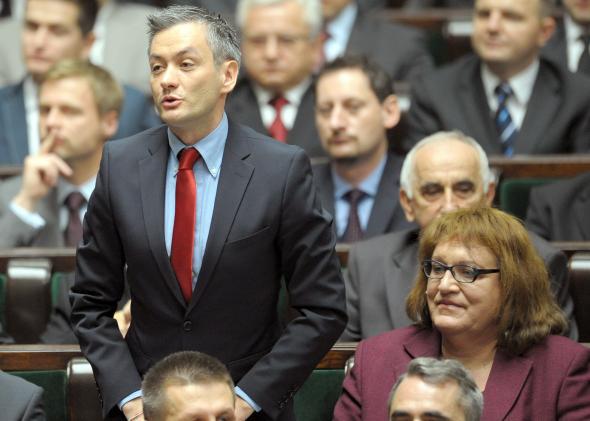It was 2007, years before Vladimir Putin supposedly developed a concern for the fate of Russia’s children, when the Polish government openly discussed instituting its own anti-homosexuality law. Education Minister Roman Giertych proposed banning the discussion of homosexuality in schools, with school administrators, teachers, or pupils who disobeyed the directive liable to dismissal, a fine, or even imprisonment. The aim, Giertych said, was to “prohibit the promotion of homosexuality and other deviances.”
That year, Poland was in the grip of anti-gay hysteria and a state-sponsored campaign of LGBTQ persecution. With the health ministry intent on creating a special committee responsible for “curing” gays, police compiling a database on gays and the gay community, and the ombudsman for children preparing a list of jobs unfit for homosexuals, thousands of LGBTQ Poles took advantage of their EU citizenship and left for the United Kingdom.
In 2007, Robert Biedron, who at the time was president of the Campaign Against Homophobia, known in Polish as KPH, said, “It’s impossible for gays to be themselves in Poland.”
Today, the situation for LGBTQ Poles is not as nakedly hostile as it was in 2007. In politics, this has something to do with the emergence in 2011 of Palikot’s Movement, a socially liberal anti-clerical political party that ran on a platform of legalizing same-sex unions. Winning an albeit modest 40 seats in the 460-seat Sejm, the lower house of the Polish parliament, Biedron became the first openly gay MP in Poland and Anna Grodzka the second trans MP in Europe (after Italy’s Vladi Luxuria).
Nevertheless, legislation favorable to LGBTQ people continues to be stymied by the two largest parties—Civic Platform and Law and Justice—which together constitute a socially conservative duopoly. To this day, and even though it has been a member of the European Union for 10 years, legal protections for LGBTQ Poles remain woefully inadequate.
On one hand, employment discrimination on the grounds of sexual orientation is prohibited by law. (The same cannot be said for gender identity, because no national anti-discrimination law explicitly refers to gender expression or intersex people.) Trans Poles can change their name and legal gender, and they can marry.
But that’s as far as it goes. There is no legislation protecting LGBTQ people from discrimination in access to goods and services, or in any sphere of life outside of employment. There are no statutes concerning hate crimes or hate speech on the grounds of sexual orientation and gender identity. There is no legal recognition of same-sex partnerships of any sort, not even in common law, nor are same-sex couples allowed to adopt.
For LGBTQ Poles, the Catholic Church is the biggest obstacle to social and political progress. As Polish journalist Slawomir Sierakowski recently noted in the New York Times, the Catholic Church in Poland is “omnipresent.” More than 90 percent of Poles belong to the church, and it enjoys “almost complete control over legislation concerning social issues” including sex ed in schools, abortion, and same-sex unions.
Yga Kostrzewa, an activist and spokeswoman for Lambda Warszawa, compared the presence of the Catholic Church in Poland to an octopus in terms of how it influences culture and society: the presence of a church in every town and village; its role in religious education in school; the way the government consults it about legislation, and so on. When there is a discussion of gay or trans issues on television, a member of an LGBTQ organisation like KPH or Lambda Warszawa will be invited to participate, but so will a Catholic priest.
One of the biggest issues for young LGBTQ people is sex ed in schools. “There is sex education in Polish schools but only on the most basic level, and often the person leading the class isn’t a proper teacher but someone from the church,” Kostrzewa told me. “When there is discussion of homosexuality in these lessons, it is usually to say that homosexuality is bad.” This begets a culture of ignorance and, when people leave school or discover better sources of information, confusion and tension.
The consequence of the nexus between church, state, and society is that, “generally, our country is very conservative,” Kostrzewa said, “so when you are different, whether that be because you’re LGBT or because you don’t eat meat, it doesn’t matter, it’s a question mark for a lot of people.” This social conservatism creeps down to street level and everyday lived experience. LGBTQ people with whom I spoke indicated that it’s common, for instance, for people to be out to their friends, where they can find love and support, but not to their families.
They also said they would feel uncomfortable holding hands in the street or kissing except in a gay or gay-friendly bar. At night, they feared physical violence, but it generally has more to do with the culture of judgement: Two men holding hands is something to be gawked at, to be noted, to be discussed, not only because it’s different, but because it’s wrong.
Warsaw and Krakow, Poland’s largest cities, are the most open and tolerant places in the country, because that’s where young people who seek a better and fuller life and feel the desire to escape the climate of social conformity are drawn to. As the capital city, “Warsaw is an island for many different people” including LGBTQ people, Kostrzewa said.
Warsaw and Krakow each have a small number of gay bars, ranging from regular clubs to less salubrious institutions heavy on darkened rooms. A few other venues—clubs, cocktail bars, and restaurants—are known to be gay-friendly. In Warsaw, some such places display a small rainbow flag sticker on their doors. (The cities of Wroclaw and Poznan also have very small gay scenes.)
Within these cities, and especially in Warsaw, although it is far from easy to be gay, contrary to Biedron’s declaration of seven years ago, it is not impossible. But the same cannot be said of the rest of Poland, a country still wedded to regressive Catholic dogma on homosexuality.
